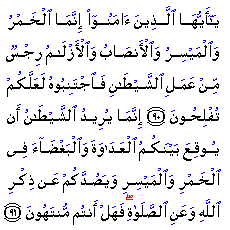Ban on Wine, Better Hand, Cryptanalysis
Issue 571 » March 5, 2010 - Rabi Al-Awwal 19, 1431
Living The Quran
Total Ban on Wine
Al-Maidah (The Table Spread) Sura 5: Verses 90-91
 "O Believers! Wine, gambling, sacrificing to idols and the divining arrows are abominations devised by Satan. Therefore, turn away from them so that you may be successful. Satan seeks only to stir up enmity and hatred among you by means of intoxicants and games of chance, and to turn you away from the remembrance of God and from prayer. Will you not, then, desist?"
"O Believers! Wine, gambling, sacrificing to idols and the divining arrows are abominations devised by Satan. Therefore, turn away from them so that you may be successful. Satan seeks only to stir up enmity and hatred among you by means of intoxicants and games of chance, and to turn you away from the remembrance of God and from prayer. Will you not, then, desist?"
The total ban on wine was enacted by the Quran in the month of Rabi al-Awwal, the fourth year after Hijrah (Migration to Madina). Before that, the Muslims were only ordered not to pray when drunk, until they knew what they were saying.
It is quite significant that the philosophy of social change advocated in this verse is not a revolutionary one, rather it is a gradual one, even in matters crucially touching the basic issues of conduct and ethics. Wine drinking, and gambling are serious moral ills, with profound adverse effect on society, yet the Quran allowed their perpetuation in the Muslim community until the fourth year of Hijrah. This reflects the Quranic preoccupation with changing people's ideas, and winning their emotional alliance first. In so far as conduct is conditioned by convictions, then it is both rational and wise to work to change people's minds and hearts first.
Compiled From:
"War and Peace In The Life of the Prophet Muhammad" - Zakaria Bashier, pp. 134, 135
Understanding The Prophet's Life
The Better Hand
Islam does not approve of begging either on the individual or the national level. Bukhari, Muslim, and Ahmad ibn Hanbal record that God's Messenger, peace be upon him, said: "The upper hand is better than the lower one." In another hadith, God's Messenger explains that the upper hand gives to the poor and needy, while the lower hand takes from others. So, besides expressing the merits of charity, this hadith encourages people to work and earn their living.
A subtle point: God's Messenger did not say the one who gives and the one who receives. Instead, he said the upper hand and the lower hand. This indicates that the act, not the person, is generally preferable. As a result, the recipient may sometimes be better than the giver.
For example, God's Messenger advised Thawban not to beg. As a result, he would not even ask someone to pick up a whip he dropped while riding his camel. So, when seemingly "poor" believers of this quality receive from people, it cannot be said that they are inferior to those who give.
Compiled From:
"The Messenger of God: Muhammad" - Fethullah Gulen, p. 107
Cool Concepts
Cryptanalysis
Communicating top secret information is a precarious and risky process, so to avoid vital statistics falling into the wrong hands, messages are scrambled, masked and coded so only those with the right information or tools can read them. This process is known as cryptography; the scrambling of a message is known as encryption and the de-scrambling is decryption. For anyone other than the intended recipient, the message is meaningless, unless that person uses cryptanalysis to break the code.
The real cryptanalysis milestone was passed by al-Kindi, who revolutionized the area when he wrote A Manuscript on Deciphering Cryptographic Messages. Part of this included a description of the method of frequency analysis, which means he noticed that if a normal letter is replaced with a different letter or symbol, the new letter will take on all the characteristics of the original one. So if all a's that appeared became t's, and all th's were replaced with g's, they would still have the features of the letter(s) they replaced. A word like athlete would become tglete! Even though the letters change, what cannot be disguised are certain characteristics a letter has, like its frequency of occurance.
If we look at the English language the letter e is the most common letter, accounting for thirteen percent of all letters. So, if e is replaced by symbol #, # would become the most common symbol, accounting for 13% of the 'new' symbols. A cryptanalyst can then work out that the # actually represents e.
From studying the Arabic text of the Quran closely, al-Kindi noticed the characteristic letter frequency, and laid cryptography's foundations which led many cryptographers from European Renaissance states to devise sever scheme to defeat it.
"The birth of cryptanalysis required a society which has reached a high standard of development in three disciplines, namely linguistics, statistics and mathematics. These conditions became available at the time of al-Kindi who had command of these three disciplines and more." - Dr. Simon Sing, The Code Book, 1999
Compiled From:
"1001 Inventions: Muslim Heritage in Our World" - Salim T S Al-Hassani, pp. 268, 269